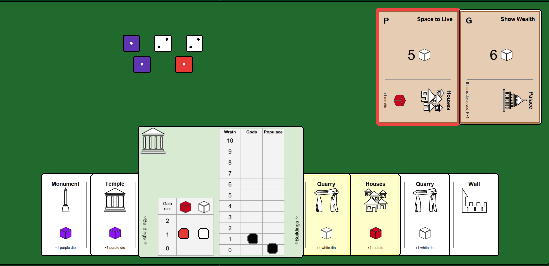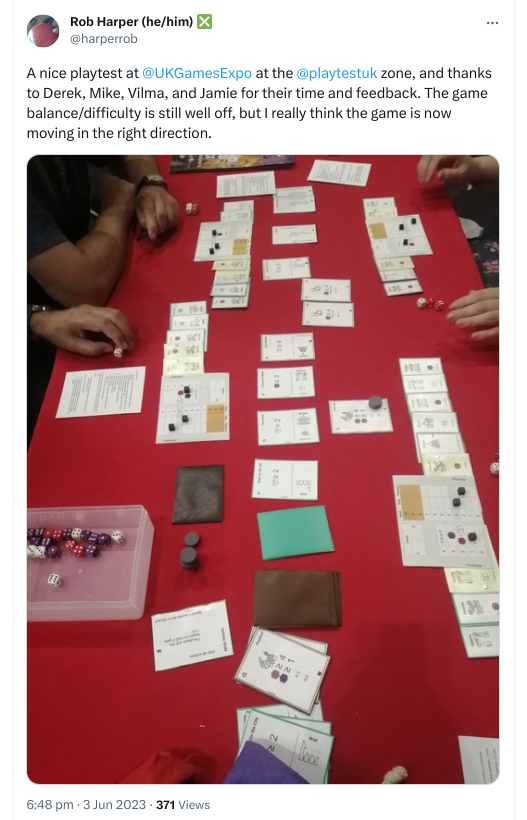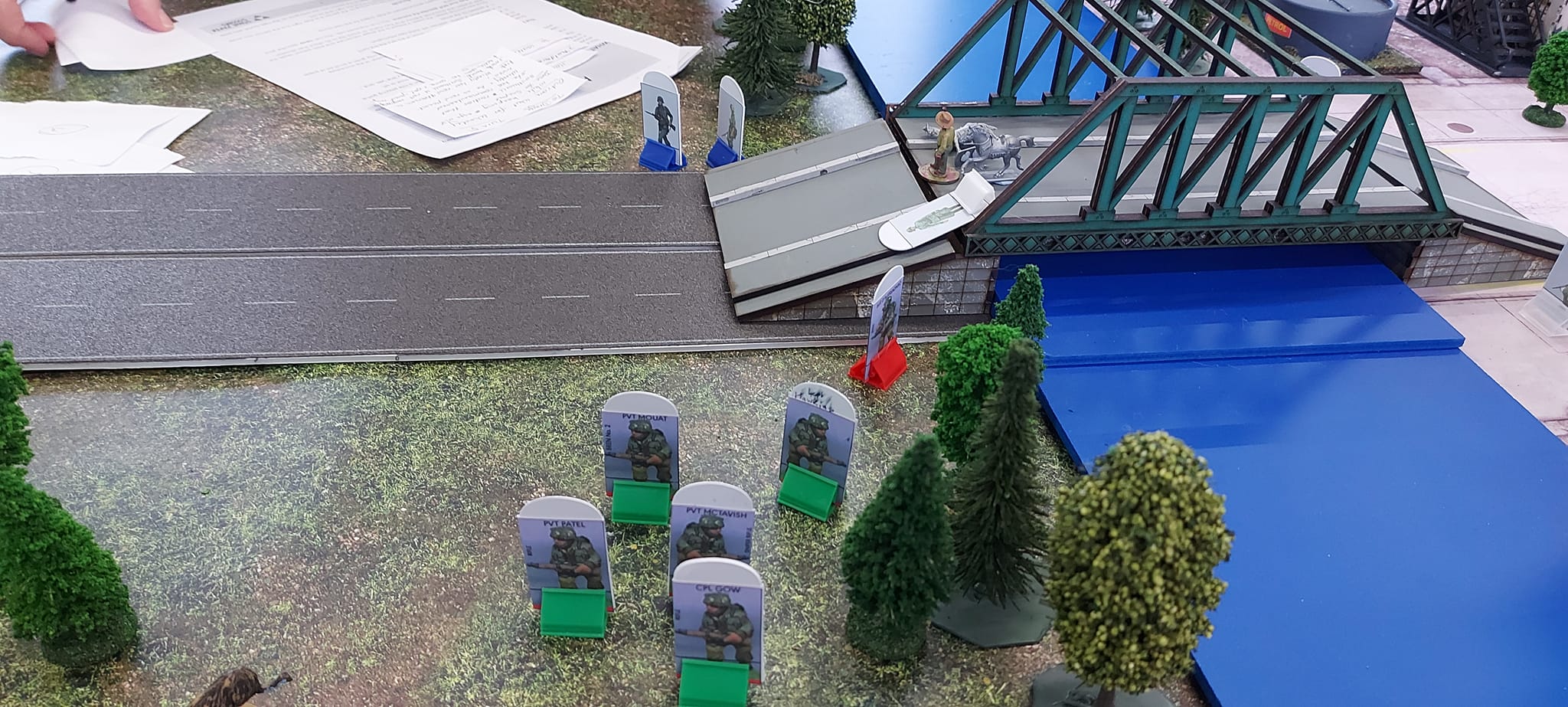A week of fun spread over months.

Playing.
These are the weeknotes1 on the games I’ve played2 purely for fun3 in the last few months. There’s very few listed below, which is very disappointing to look back on… I can’t help thinking I’ve missed a couple. But I do have a “new” Xbox360, and I’ve been tidying up some space, so maybe that will change. It kind of needs to change, considering how much time I spend thinking about games and game design.
Board games

City States.
City State Co-op is an intriguing game in development by Rob Harper, as detailed in this tweet. This is an interesting co-operative game where you and the other players are the leaders of warring Greek states, but rather than trying to overthrow each other, you’re more concerned about the general population over-throwing all of you. Oh, and the gods not obliterating you, and the barbarians not invading you. So you need to keep everyone happy, while appearing to be trying to successfully battle each other. This is just the right amount of theme for a eurogame to keep my “why can I only move those dice there?” brainworms happy. I find a lot of “euro” games are basically a mechanic with a random theme on top, which is one of the reasons I’m generally not into that entire genre.
Playtesting this I particularly liked how much complexity was built from simple precepts, some of which left a lot of space for interpretation. For example one type of building for your city, if obtained, allows you to “re-roll”. It’s clear you can only use this re-roll ability once per turn, but it wasn’t clear whether that was only in your part of the overall turn, and whether it only applied to your dice, or any dice currently in play. As long as it is carefully managed I think that lack of clarity gives a lot of space for interpretation and strategy. Also while I think I’d only play this with the right people, playtesting and discussing it on the screentop online site ( which is recommended ) reminded me how much more I enjoy discussing how to play games than playing them.
I see from this tweet it’s still in development, do keep an eye out for it.

That tweet, because they're more ephermeral now than they were.
Video games
None.
Well, apart from a little Animal Crossing:New Leaf on a Nintendo DS, for the first time in some time. So on returning to my village I discovered that Frobert had left, and Maelle has moved in. She looks like she’s going to be “a lot”.

Maelle.
Oh, and Fortnite sporadically - the current season appears to be fun enough to jump into and out of for Team Rumble… well, for most of a match anyway. The end always descending into… for me… a melee in a small open area with little room for thinking.
And also a little Rocket League on the Nintendo Switch, but only often enough to be worth this single sentence.
Otherwise

Figuratively and literally flying the flag.
Flying The Flag was an online playtest of an influence game, played over Discord a few months ago. The setting involved a country’s flagship, in the current time, on a tour of foreign islands spreading influence and hosting meetings and throwing parties. As with the other playtesting I do with Stone Paper Scissors it led to some thought provoking conversations, especially on how to play very foreign mindsets, and the kind of strategies those mindsets prefer. In this case I was one of a couple of criminal organisations, so not my world at all.
Influence wargames are an interesting format, especially when it’s handled in this way. Usually such a vague subject is relegated to matrix4 games or the classic BOGSAT ( Bunch Of Guys Sitting Around a Table ) formats, neither of which really enables you explore the breadth of actions that are possible in such a nebulously defined area of conflict. That is especially true of the civilian groups involved, which might be played in this kind of game, or be significant NPEs ( Non-Played Entities ) whose opinions are the “terrain” you’re fighting over.
I also played Emu Wars in a hybrid way, taking part remotely. A sign of how thought provoking this game was is that I didn’t make many notes. It’s an in-development co-operative game about the Great Emu War that was interesting to play, I’m hoping the developer continues to work on it, because while the subject matter is a bit of an Internet joke there’s some really interesting issues around the events, and there was obviously considerable research that had gone into the game. Also the format of the incident is made for co-operative or asymmetric play.

British paratroopers take advantage of a loose horse to run across the bridge in The Dialogue Game. Picture courtesy of Jim Wallman.
I also recently played the The Dialogue Game. This is a “round-robin” game format, to explore a scenario. In this case each player was assigned a squad of troops, landing as part of Operation Market Garden. They would describe what their squad would do, which would be reflected in moving that squad across the map, but then set a problem or situation for the next player, such as “you think the guards across the river have seen you”. That player would then describe their course of action, but then pose the situation for the following player, and so on. The turn order was varied, to stop people always receiving their description from the same player.
So it’s kind of like a Games Master or Dungeon Master less role-playing game, but only kind of. For the combat situation I’m not sure it worked, especially as a player called Evan highlighted, it is potentially much more suited to a situation where the controlled entities are discrete and separate, rather than interacting against the same objects or situations in real time. Then sequencing and things like “initiative order” feel like they should be present. Then again that could be countered by some kind of Game Controller or lead narrator; someone to tie the threads together, while not having the overall control that a Dungeon Master has.
The format is really interesting through - I’d like to try it with with experts in a relatively known environment. Especially due to the implied rules, because responsibility for invented and describing actions is passed back and forth everyone has to talk to everyone else, and at some point each player will put every other player into a situation, so everyone gets a say, and the power dynamic is relatively balanced. It’s kind of a group story telling game, there’s no aim to win or lose. As everyone either typed “orders” into a Discord channel, or wrote them down in person, the opportunity to capture data and look back over the participants decision making is intriguing.
Lastly a quick half-mention of TINAG, the game title standing for “This Is Not A Game” - a wargame / megagame that is a loose simulation of how wargames are procured, with players representing a variety of sponsors, customers, suppliers, and experts. I only kind of played remotely, as this was a full on playtest taking place in the usual CLWG location, but even then it gave me many flashbacks of my time working for a Systems Integrator in sales and pre-sales. Obviously a work in progress ready for this year’s forthcoming Connections UK wargaming conference. There’s just enough format here to help explore the kind of gameplay that can take place in any sales situation, for example suppliers setting up cartels to manipulate price and/or availability. Also it looks like it’ll be just long enough to show the benefits to sales teams of building relationships with customers rather than the more traditional sales approach of fleecing customers for as much as possible. I’m looking forward to hearing how this goes.
Epilogue
I need to play more games, but I think I said that last time.
-
In my weeknotes terms a “week” is the time period between when I last wrote my weeknotes and now. ↩︎
-
Image by Daniela Dimitrova from Pixabay. ↩︎
-
As opposed to the games I play purely for work or educational purposes. But the line between work and play for me is very indistinct, but that’s a subject for another post, and is definitely too much for a footnote. ↩︎
-
This is very much a “matrix game” in my understanding of the term from a professional wargaming perspective, see this Wikipedia entry for a short explanation. ↩︎
